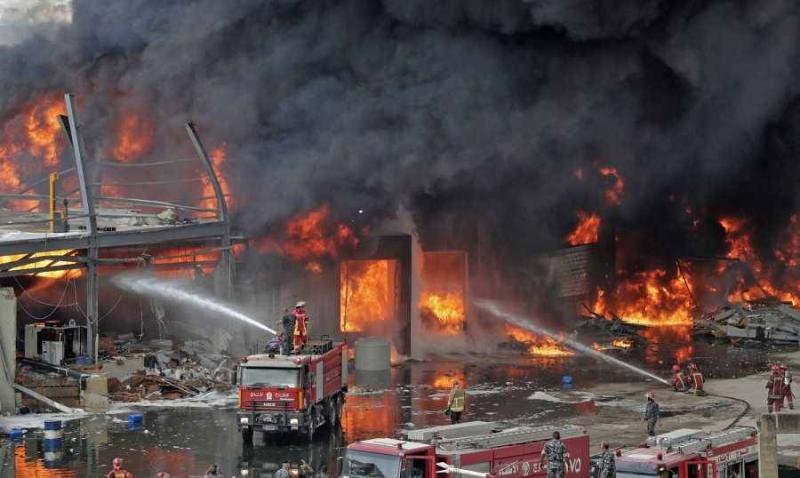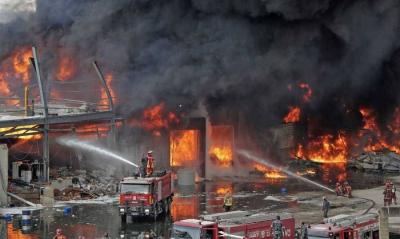After the tragic experience that Lebanese people continue to endure following the disaster of the Beirut port explosion on August 4, 2020, caused by tons of ammonium nitrate, any discussion about chemical substances stored in any facility raises concerns for the Lebanese as if they are living over temporary explosive devices ready to detonate at any moment, potentially claiming thousands of victims. This is particularly true given the ongoing discoveries of such hazardous materials from time to time.
Following the Beirut port explosion, explosive materials were found at the Zahrani thermal power plant in southern Lebanon, which a German company later removed. This scene repeated itself at the Tripoli port, and today the nightmare again occupies the minds of the Lebanese after the seizure of 50 tons of explosives stored haphazardly inside the Zouk thermal power plant. Security sources have classified these materials as "extremely dangerous," with the potential for massive destruction in the area if they were to explode, according to "Independent" Arabic.
#### Administrative Procedures
The roots of this issue go back to 2022 when Lebanese Interior Minister Bassam Mawlawi announced the presence of explosive hazardous materials in the Zouk thermal power plant, along with hydrogen tanks and fuel oil, which could lead to massive destruction if exposed to sabotage or terrorism.
According to information, these materials are used to operate the plant, including expired materials poorly stored between houses and near gas facilities. This includes "sodium hydroxide" and trisodium phosphate placed in plastic barrels on wooden pallets and wrapped in nylon. It was supposed to be handed over to the German company "Techmo" to be shipped outside Lebanon for destruction, but they remained in place due to delays in completing the administrative procedures, particularly those requiring approvals from the Ministry of Environment and the Customs Administration at the Beirut port, which did not grant permission to load them onto the ship due to incomplete legal requirements.
#### Emergency Session
After the issue was raised again, residents staged a sit-in outside the plant amid fears over why these materials continue to remain there, especially since the facility has been out of service for years. They refuse to allow the plant to become a storage site for hazardous materials due to the neglect faced by official facilities and poor management.
In this context, MP Selim El Sayyeg pointed out that the Zouk plant ignites anxiety and fear among the people, emphasizing that the authority is responsible due to conflicting information regarding the danger of the materials inside the plant. He added that the Minister of Environment stated he did not have a file to remove these materials, and that for three years the file has not been completed or handed over. There have been correspondences and discussions not based on scientific matters or conforming to international standards, asserting that the file must be sent to foreign authorities for them to accept the removal of the materials.
El Sayyeg believes that this chaos indicates that the state lacks balance, lacks a clear reference, and involves a game of shifting responsibilities. He called for an urgent session of the Cabinet for the removal of these materials and urged citizens to support this move to ensure its implementation, promising to follow up on this file as the executive authority has openly admitted its shortcomings.
#### Last Warning
The mayor of Zouk Mikael, Elias El Baineh, sent a letter to Electricité Du Liban, stating that after a long wait and the institution's failure to take the necessary steps to eliminate the imminent danger to the area, and noting a lack of seriousness in addressing this sensitive issue, the municipality of Zouk Mikael informs that it can no longer tolerate any delays from your institution while holding it fully responsible for any potential dangers or disasters. The municipality considered this letter a final warning to provide all required documents and expedite the removal of the materials, which were contracted for removal three years ago but have not yet been evacuated. Otherwise, the municipality of Zouk Mikael will have to take all necessary and appropriate measures to prevent any harm to its citizens.
Council member Nathalie Farah indicated that the danger of those materials lies in their reactivity and that they are not capable of exploding if distances and packaging are according to international standards, confirming that they are free of ammonium nitrate. She clarified that the containers are tightly sealed. However, there are concerns about cooling conditions and that 32 bags have begun to deteriorate.
#### Military Action
A security source specialized in explosives (who requested anonymity) revealed that the danger of those materials is linked to two factors: the possibility of their reactivity due to neglect, poor packaging, and the passage of time, and the current security tensions in the country that could lead to sabotage or military action. In both cases, the reaction of 15 types of those chemical materials would create an explosion equivalent to that of the Beirut port explosion.
The source noted that the explosion's strength would be amplified due to the presence of oil and gas facilities near the plant. Consequently, we are discussing comprehensive destruction with a radius of 20 kilometers in an area inhabited by about a million people, which would create a severe humanitarian disaster, arguing that in military terms, it is akin to the destruction of a nuclear bomb ready to turn the entire region to rubble. Regarding the cost of dismantling, he confirmed that the cost may not exceed two million dollars for shipping and dismantling, a modest amount compared to the dangers of an explosion that exceed 20 billion dollars. He argued that in a country like Lebanon facing security instability and the potential for an expanded war with Israel, where infrastructure can become military targets, the removal of these materials is an urgent and necessary measure.
#### Political Exploitation
Former Minister of Energy and MP Nada Boustany accused political entities of exploiting this issue for their agendas. She noted that Electricité Du Liban issued several statements denying the existence of these materials within the plant, urging all political parties behind these calls to show compassion for a population living in constant fear and anxiety.
Boustany pointed out that the Lebanese Army intelligence, the Ministry of Environment, and Electricité Du Liban confirmed that there are no chemical materials inside the plant, asserting that “the plant is free from any chemicals,” believing that a political entity is behind this movement, arguing that such a matter is too dangerous to play political games with.
Environment Minister Nasser Yassine announced that the chemical materials in the Zouk plant should be evacuated as soon as possible to countries capable of treating them appropriately, emphasizing that the chemicals there are corrosive and not explosive.
MPs Najat Aoun, Paula Yacoubian, and Yassine Yassine, along with Ibrahim Mneimneh, Firas Hamdan, and Melhem Khalaf, submitted a question to the government regarding the hazardous materials stored in the Zouk thermal plant, highlighting the critical importance of and the urgent need for immediate action concerning this matter according to "Independent" Arabic.




